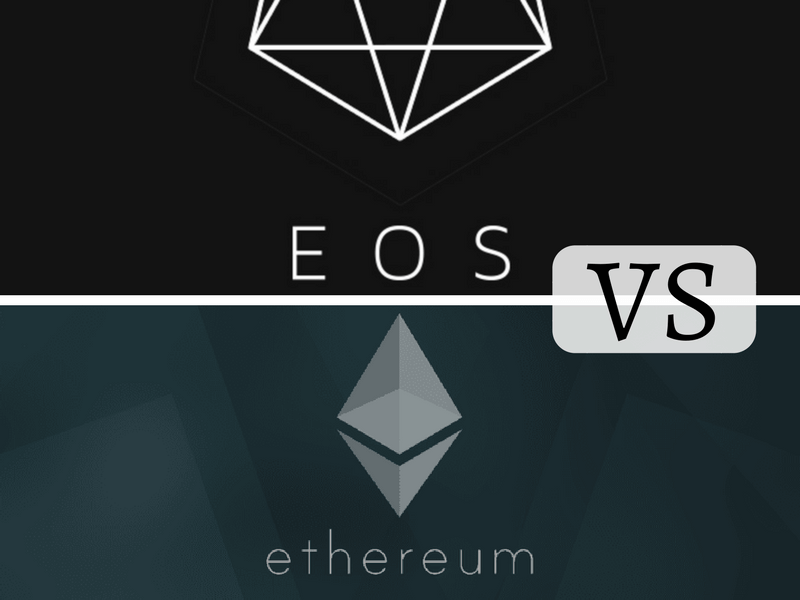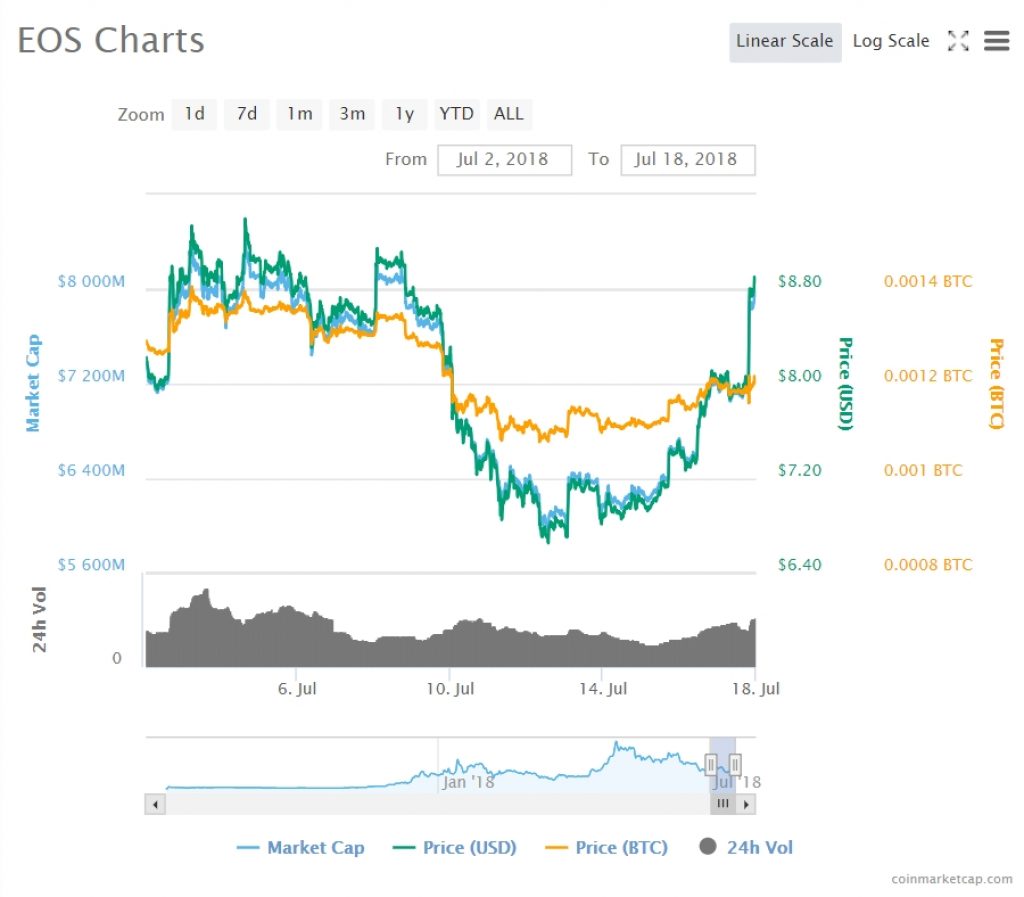
EOS has had a good week price-wise, as it managed to break out of the downs of $6,65 USD it reached on July 12th and rise all the way up to $8,10 USD, where it sat until today’s massive Bitcoin breakout. Rubber banding after the king of the market, EOS experienced a solid rise on July 17th as it reached $8,88 USD at the moment of writing, with no apparent signs of slowing down. The coin’s price went up nearly 11% in the last 24 hours. Its current market cap of $7,960,092,672 USD gives it the 5th spot on coinmarketcap’s list of most valuable cryptocurrencies. If the breakout continues, we could see EOS reach the cap of $8 billion USD for the first time in a while.

First resistance for the coin can be seen at $9 USD, with possible support currently sitting at $8,50. Bitcoin consolidating for a couple of days could swing these numbers heavily past the $9 USD mark.
EOS managed to post an important milestone today, as its blockchain achieved a platform record-breaking 2351 transactions per second. Reddit was certainly elated, as SuddenAnalysis posted:
“this is crazy, isn’t this still only single threaded implementation. This is really starting to look like state-of-the-art tech instead of the clunky indeterminate throughput blockchains we’re used to”
While the news are good, especially since EOS now trumps ETH blockchain with a hundred times better throughput, sceptics claim that there are protocols with higher txps out there already. Another thing to note is that EOS needs users and dApps to make sure that all this beautiful throughput is actually used.
In a somewhat more sinister piece of news that dropped lately, EOS was accused of helping the creation of a series of unsupported airdrops which were designed to overload the Ethereum network and force developers and users to switch onto EOS blockchain. The accusation was made by one named Justo, a man known for his work on gambling dapps PoWH3D and Fomo3D.
Justo had a brief interview with trustnodes.com during which he revealed a lot of dirt on EOS. The full transcript of his address says:
“Myself, and many other high profile ethereum application developers made a prediction that EOS would in all likelyhood, attempt to attack the eth network gas prices to validate the launch of their platform.
Without fail, every day up until the launch of the EOS platform, which was June 6th, gas prices increased due to “Airdrop” tokens.
Thousands of random tokens, with no website, or bootstrapped template websites made in hours. Wasting hundreds of ethereum daily, hundreds of thousands of dollars to drop tokens.
This happened up until the launch of EOS, on the 6th, then immediately stopped. In one day, gas prices dropped back to normal.”
According to this, EOS has been actively producing zombie tokens that were meant to overwhelm the Ethereum network and increase GAS prices on it. Justo notes that the airdrops were later on used to draw attention away from the issues that EOS experienced during its mainnet launch.
He reached these conclusions by manually investigating the funding and the movements of one of these airdrop tokens. The token in question is named IFishYunYu; Justo found that it doesn’t have any features and was partly funded by an address that received “a lot of crowd-funded EOS”. He also noticed another coin, Hashcoin, is exhibiting similar characteristics:
“I actually saw this coin earlier when i was investigating ifish, one of the wallets was owning it. Looks like an entire network of s*** coins connecting into one another to look legitimate,” he adds.
Justo closes his findings by saying that the IFish creator is effectively wash trading on the Ethereum blockchain. Vitalik Buterin didn’t take a lot of time to respond to this, tweeting:
“According to my estimates, the recent tx spam on the ETH network cost up to ~$15m USD (~= 5m green teas, ~75 lambos, ~25 Coinbase seed rounds, ~0.9% of Telegram ICO) Free market principles prevent me from being too upset at someone using the ETH blockchain as they wish, but wow.”
EOS community doesn’t have a problem with the biggest smart contract platform on the market (and their biggest competitor) suffering. A post from AGameDeveloper on Reddit sums up their feelings:
“If a coin can be attacked then it doesn’t matter if block one or the CIA decide to do it. It shouldn’t be possible in the first place.”
Dan Larimer, creator of EOS and block.one, also officially responded on the issue by saying:
“I can assure you block one wouldn’t be so stupid to spend our resources attacking eth when all it takes is crypto kitties. There are far smarter and more cost-effective ways at bringing eth down if that were the goal.”
While Ethereum does deserve criticism for their transaction throughput, attacking the network intentionally is at best insidious and at worst a crime. Ethereum is working on a solution to the issue as Plasma is slowly but surely being developed. EOS initial mainnet issues, while mostly resolved by now, have tainted the name of the 4 billion USD project quite a lot. If it’s found that important parts of the EOS network have indeed been trying to undermine its biggest competitor in such a direct way, EOS will surely suffer another heavy blow to its already shaky integrity.






